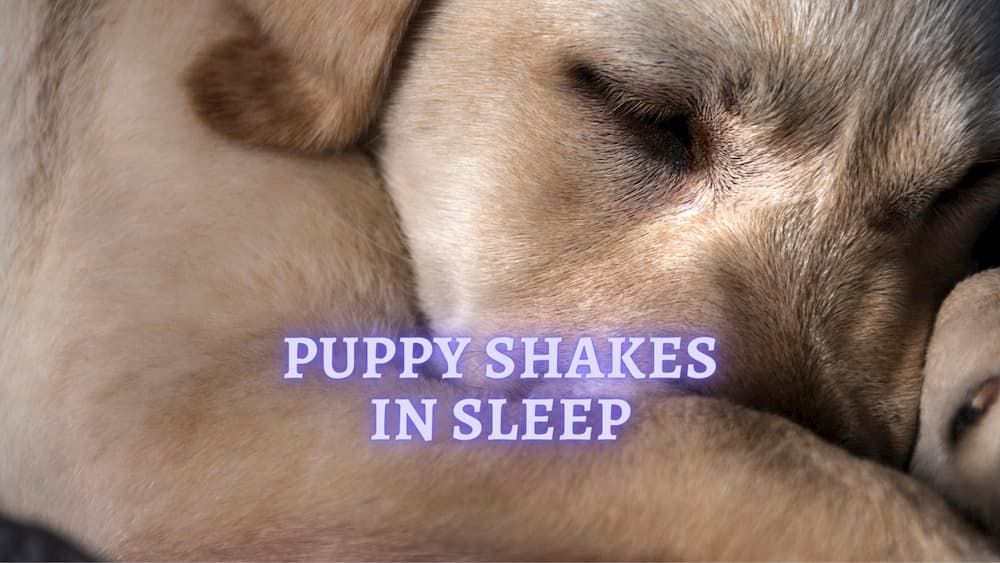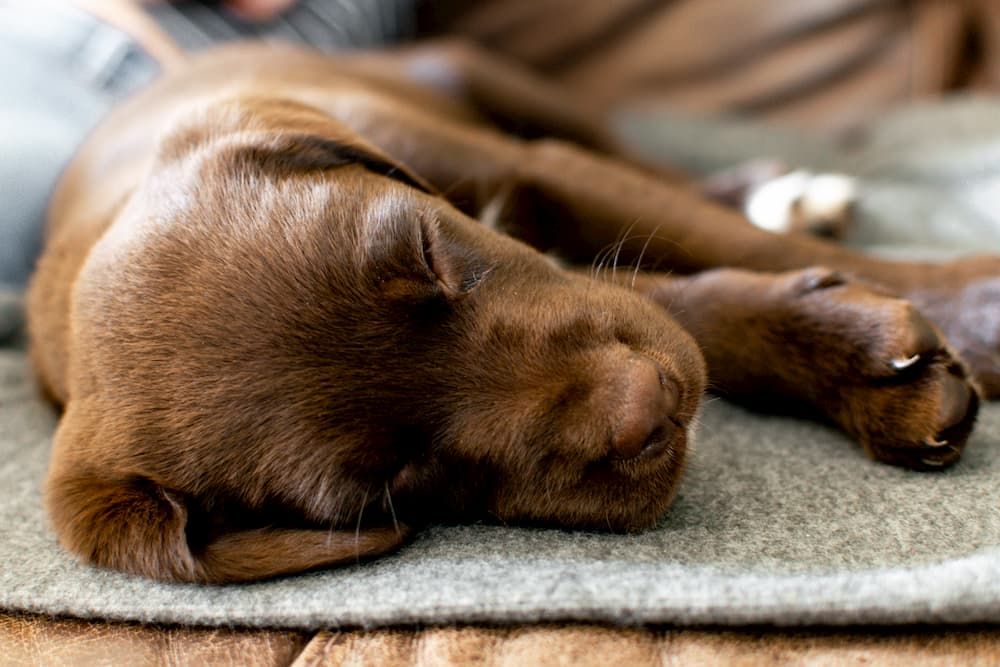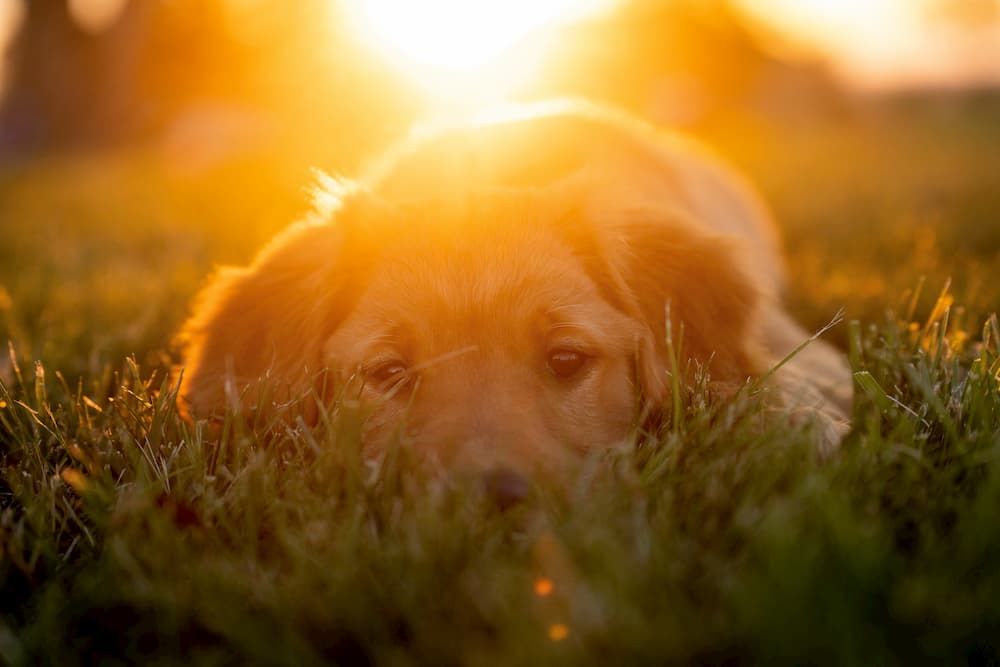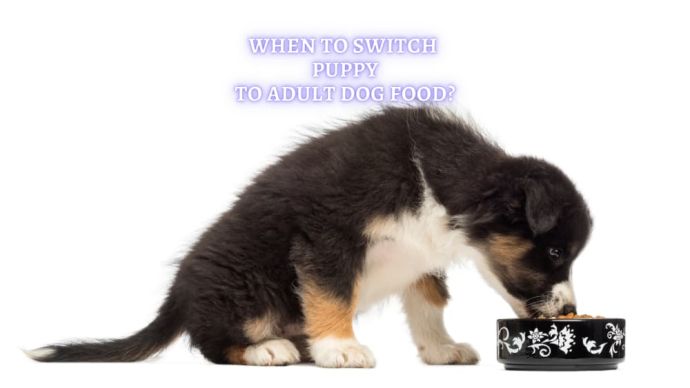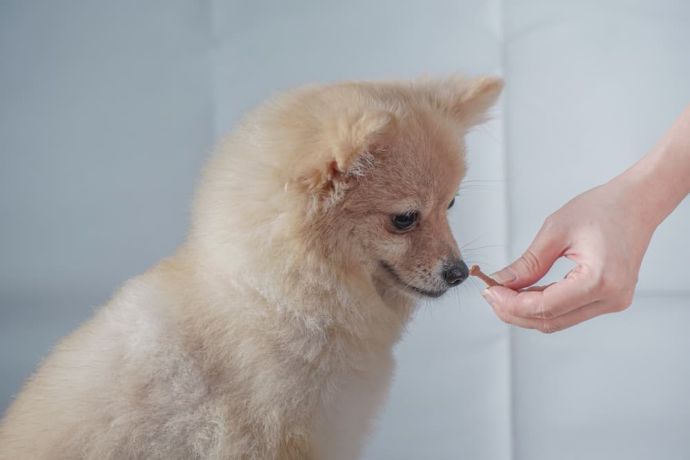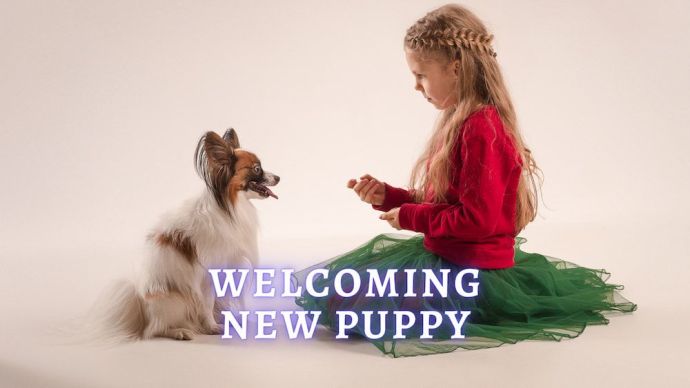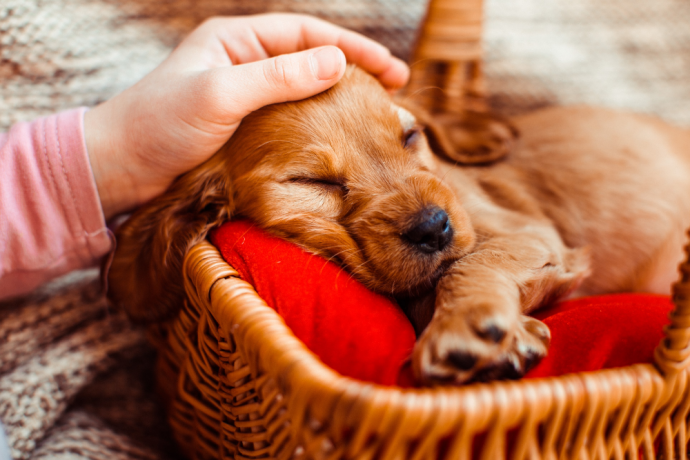Why is my Puppy Shaking in his Sleep?
Written by:
Author: Vicki Smirnova
Vicki Smirnova is a professional writer and editor who adores animals and helps readers get along well with their pets. She has been working in digital media for more than 5 years and has great experience writing content about lifestyle, including pets. Vicki specializes in dog health and nutrition, cat feeding, dog training. She is an aquarium lover and is passionate to write about fish care at home. Also, Vicki headed several websites and worked as a news editor.
View all 244 articlesLearn about our editorial process and veterinary review board.
Reviewed by:
Veterinary review
by Dr. Joanna De Klerk
Dr. Joanna de Klerk is a professional Clinical Veterinarian. Member of the Royal College of Veterinary Surgeons UK and a member of the South African Veterinary Association. Graduated with a Master of Science in Tropical Animal Medicine in 2018. Professional author, she has been writing in scientific journals, and also several book series. Joanna loves to enjoy time with her young daughter and family in her free time.
View all 10 articlesLearn about our veterinary review board
Viewed: 1411
Updated on: 06/26/2023
It might not seem possible, but a dog can lead a very active life during sleep: it can twitch its limbs, flinch, whine, wiggle its ears, grin, and even howl. While there is a harmless explanation for this behavior, there are several situations in which a dog twitches in his sleep due to pathological conditions and may need emergency medical care. But how do you not miss the first alarm bells and not confuse the usual behavior of a pet with the symptoms of the disease?
Causes my Puppy shakes when Sleeping
Shivering occurs in both people and dogs; in particular, small puppies. So why are the puppies shaking? The problem is a whole set of reasons, which we will now consider.
1. Too cold
This is the first thought that usually comes to mind, and is quite likely, as the thermoregulation in a small puppy is not yet well-developed. Puppies of some breeds are generally very susceptible to cold (chihuahua, etc.), so initially keep your small pets warm, especially at night.
2. Hunger
A hungry puppy will feel cold much earlier than a full one because its body didn’t get enough calories. Much depends, again, on the characteristics of a particular breed, as well as on the amount of subcutaneous fat.
4. REM Sleep
Some puppies shiver in their sleep (in the so-called REM sleep phase). You can even observe twitching eyes under the lowered lid and funny paw movements. Scientists have repeatedly questioned the fact that these animals can dream. In the middle of the last century, it was suggested that dog shudders during sleep are not because of dreams but because of nervous reactions.
The research was carried out with the help of equipment, and the hypothesis was confirmed. After such a statement, the issue of dog sleep attracted even more attention, and it was actively studied. A decade later, various publications increasingly appeared containing articles on this topic. By observing the movements of the ears of sleeping dogs, scientists were able to discover that dogs not only see dreams but also hear them. In the ’80s, with the help of the latest equipment, they received confirmation that dogs see disturbing, frightening dreams and can live events already seen during sleep.
4. Fear
In the first year of life, the dog is learning the world, and it faces many things that inspire fear and awe. Trembling is a natural reaction of a puppy’s body to fear and fright. With proper training and socialization, everything will pass with age.
5. Excitement
Shivering with excitement usually occurs in puppies of highly active breeds. The excitement, in this case, is of a slightly different kind — an “excitement from impatience;” for example, impatience of waiting for a walk, new meetings, new acquaintances, new knowledge.
6. Hereditary health disorders
Dogs shake due to inherited diseases (shaker syndrome, in particular). Often, this disease affects West Highland White Terriers and Maltese Lapdogs, among others. If you notice your dogs shake and is not coordinating its movements well, contact your veterinarian immediately. It’s important to make a correct diagnosis and start treatment as soon as possible!
6. Diseases and infections
Shivering in puppies may be caused by a wide range of different infectious diseases. That is why many respected authors advise refraining from contact with other dogs (and from active walks) until the puppy is fully vaccinated.
In any situation, do not take risks unnecessarily — if there are any doubts or suspicions, do not look for answers on the Internet, and seek professional advice from a veterinarian. Thus, you will protect your little pet from many problems; you may even save his life.
When there is no Reason to Worry
If a small pet twitches and whines during daytime or nighttime sleep, you should not worry. It is also normal if the sleeping puppy’s eyes are not completely closed. In this case, you can examine the eye and understand that it is protected by a transparent film — this is the third eyelid.
If you watch a recently awakened puppy, you can see how he tries to repeat what he saw in a dream: the pet abruptly moves his paws in a dream, trying to run. Usually, the dog lies on his side, his paws begin to twitch, and sometimes this process is accompanied by whining and even barking. Some babies bark so loudly that they wake themselves up.
If a puppy is active during sleep, it means that he has entered the REM phase. When the dog wakes up on his own, and he was not woken up earlier, he will not remember what he saw in the dream. And if the dog was awakened by his own barking, he might jump up and continue what he was doing in the dream, which is quite normal.
How not to Miss the Warning Signs?
Novice owners can be intimidated by their pet’s natural twitching during sleep, as it resembles convulsions. If in doubt, you can try to wake your pet. A healthy dog quickly wakes and reacts to you, and if it turns out to be a convulsive attack, it is impossible to rouse them from the involuntary shaking.
If your puppy is weak after awakening, barely raises his head, does not stand on his paws or does it slowly, straining hard, you cannot delay – you should take your pet to the veterinary clinic as soon as possible.
Severe weakness occurs in the animal after suffering convulsions, which don’t stop when the owner calls him sharply or tries to wake him up. If the dog starts to get up or run in a sleeping state, you should think about whether he is in a stressful situation in his sleep.
Weak twitching of the limbs in sleep is normal, but intense, jerky movements of the legs can signal serious violations of the central nervous system.
Even a 10-minute procedure may reveal the following signs of the disease:
- Apathetic state – the dog is sluggish, looks away, does not respond to a call to walk or play.
- Aggressive behavior — the dog shows its teeth, growls, or even bites when the owner calls the pet to contact or tries to pet him.
- Loss of appetite — food remains in the bowl, or the dog refuses it altogether.
- The dog drinks a lot for no apparent reason, or, on the contrary, refuses to drink.
- Increased (hot, dry nose) or decreased (cool limbs) body temperature.
- Deterioration of the quality of his coat — the hair becomes disheveled, loses its silkiness and shine (this is often associated with a violation of metabolic processes in the body).
- Abnormal acceleration (tachycardia) or deceleration (bradycardia) of the pulse when the dog is in a calm state.
- Change in the color of the mucous membranes in the oral cavity — it becomes whitish, bluish or yellowish. These are all indicators of the need for urgent veterinary attention.
- Partial or complete loss of coordination is a sign of disorders of the central nervous system.
- Intense trembling that turns into convulsions in a sleeping dog.
- Twitching in a dream can occur if the pet has experienced a lot of stress — after moving, traveling, being in a crowd of people, getting lost on the street, etc. When the dog is in a safe environment, the response of the central nervous system may be a spasm.
READ MORE: How to know if your Puppy is Sick? (Vet Advice)
The following Conditions can dramatically affect the Dog’s Physiology and Sleep:
- Intoxication — the main signs are vomiting, diarrhea, lack of appetite, lethargy or convulsions.
- Heatstroke — the pet looks tired and exhausted; in this case, it is recommended to take his temperature. A normal temperature is 101 to 102.5 degrees Fahrenheit (39.17 °C).
- Hypothermia — a cold dog will not have convulsions if he is healthy, but a sick, weakened animal can significantly deteriorate.
- Dehydration — a convulsive attack only accompanies severe dehydration.
- Diseases – caused by pathogens that affect the nervous system or cause an extremely high fever.
Many pathological processes, both acute and chronic, can cause the dogs twitch during sleep. The owner should pay more attention to the condition of a four-legged friend. And if there are no warning signs – you can just smile when the pet “runs” or “talks” in a dream.
FAQ
Is it normal for puppies to shake in their dogs dream?
This is normal for a dog. Periodic dog’s shaking appears in the short phase of sleep, during the period of activation of the brain. It is said that the dog sees animals dream. In the deep sleep, or when the pet wakes up, the tremor in the dog goes away.
Why is my puppy shivering and rapid eye movement while laying down?
If your pet is twitching in their dogs dream, this is a good indicator that they are sound asleep. Dogs have the same sleep phases as humans, including short-wave sleep and REM sleep. You can often see that in a dream a dog kicks the air, as it were. On average, dogs sleep between 12 and 14 hours a day.
Is my puppy twitching in his sleep or is it a seizure?
Any dog twitches in a dream; an inexperienced owner may be disturbed by such a phenomenon. In some situations, experiences are far from groundless, but in order to draw the right conclusions, you need to be able to distinguish between sleep and fainting, tremors from tics, and twitches from convulsions.
What is shaking puppy syndrome?
Shivering in a puppy is caused by many different situations and conditions, among which the most common causes are agitation, pain and nausea. However, shaking may be a sign of something more serious. Puppies are often shaken by poisoning, kidney disease, and even neurological problems.
 Puppy Care How Much Water Should A Puppy Drink? Vet Advice On Puppies Daily Water Intake
Puppy Care How Much Water Should A Puppy Drink? Vet Advice On Puppies Daily Water Intake - 421
- 0
 Dog Veterinary Tips Why is my Dog throwing up: Causes and Preventing (Veterinary Advice)
Dog Veterinary Tips Why is my Dog throwing up: Causes and Preventing (Veterinary Advice) - 23424
- 5
 Dog Care Why Is My Dog Bleeding From Its Butt? Causes and treatment of rectal bleeding in the dog
Dog Care Why Is My Dog Bleeding From Its Butt? Causes and treatment of rectal bleeding in the dog - 22076
- 0
 Dog Care My Dog Keeps Scratching His Mouth: Reasons Why Your Dog Scratching Face
Dog Care My Dog Keeps Scratching His Mouth: Reasons Why Your Dog Scratching Face - 17561
- 1









